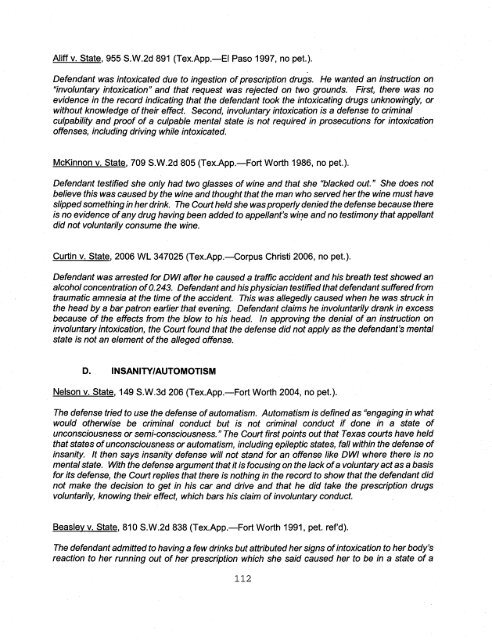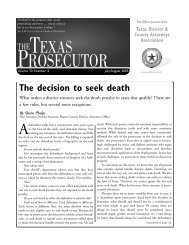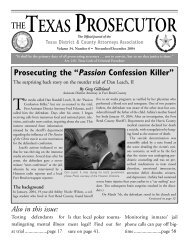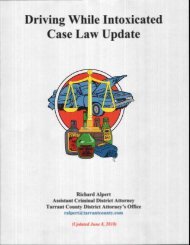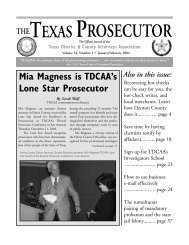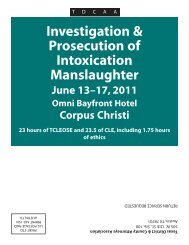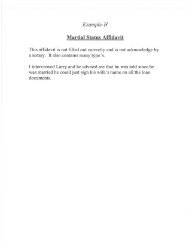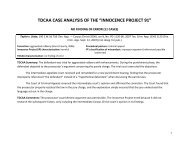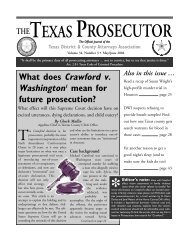Driving While Intoxicated Case Law Update - Texas District ...
Driving While Intoxicated Case Law Update - Texas District ...
Driving While Intoxicated Case Law Update - Texas District ...
You also want an ePaper? Increase the reach of your titles
YUMPU automatically turns print PDFs into web optimized ePapers that Google loves.
Aliff v. State, 955 S.W.2d 891 (Tex.App.-El Paso 1997, no pet.).<br />
Defendant was intoxicated due to ingestion of prescription drugs. He wanted an instruction on<br />
"involuntary intoxication" and that requesf was rejected on two grounds. First, there was no<br />
evidence in the record indicating that the defendant took the intoxicating drugs unknowingly, or<br />
witttout knowledge of their effect. Secon4 involuntary intoxication is a defense to criminal<br />
culpability and proof of a culpable mentalsfafe is not required in prosecutions for intoxication<br />
or7enses, i ncl ud ing driving wh ile i ntoxicated.<br />
McKinnon v. State, 709 S.W.2d 805 (Tex.App.-Fort Worth 1986, no pet.).<br />
Defendant testified she only had twoglasses of wine and that she "blacked oLtt." She does nof<br />
believe fhis was caused by the wine and thought that the man who serued her the wine must have<br />
slipped something in her drink. The Court held she was properly denied the defense because there<br />
is no evidence of any drug having been added to appellant's wine and no testimony that appellant<br />
did not voluntarily consume the wine.<br />
Curtin v. State, 2006 WL347025 (Tex.App.-Corpus<br />
Christi 2006, no pet.).<br />
Defendant was arrested for DWI after he caused a traffic accident and his breath test showed an<br />
alcohol concentration of 0.243. Defendant and his physician testified that defendant suffered from<br />
traumatic amnesia at the time of the accident. This was allegedly caused when he was struck in<br />
the head by a bar patron earlier that evening. Defendant claims he involuntarily drank rn excess<br />
because of the effects from the blow to his head. In approving the denial of an instruction on<br />
involuntary intoxication, the Court found that the defense did not apply as fhe defendant's mental<br />
sfafe r's not an element of the alleged offense.<br />
D. INSANITY/AUTOMOTISM<br />
Nelson v. State, 149 S.W.3d 206 (Tex.App.-Fort Worth 2004, no pet.).<br />
The defense tried fo use the defense of automatism. Automatism is defined as "engaging in what<br />
would otherwise be criminal conduct but is not criminal conduct if done in a state of<br />
unconsciousness or semi-consciousness. " The Court first points out that lexas courts have held<br />
fhaf sfafes of unconsciousness or automatism, including epileptic sfafes, fall within the defense of<br />
insanity. lt then says rnsanity defense will not stand for an offense like DWI where there is no<br />
mental state. With the defense argument that it is focusing on the lack of a voluntary act as a basis<br />
for its defense, the Court replies that there is nothing in the record to show that the defendant did<br />
not make the decision to get in his car and drive and that he did take the prescription drugs<br />
voluntarily, knowing their effect, which bars his claim of involuntary conduct.<br />
Beasley v. State, 810 S.W.2d 838 (Tex.App.-Fort Worth 1991, pet. ref'd).<br />
The defendant admitted to having a few drinks but attributed her signs of intoxication to her body's<br />
reaction to her running out of her prescription which s/re sard caused her to be in a state of a<br />
rL2


